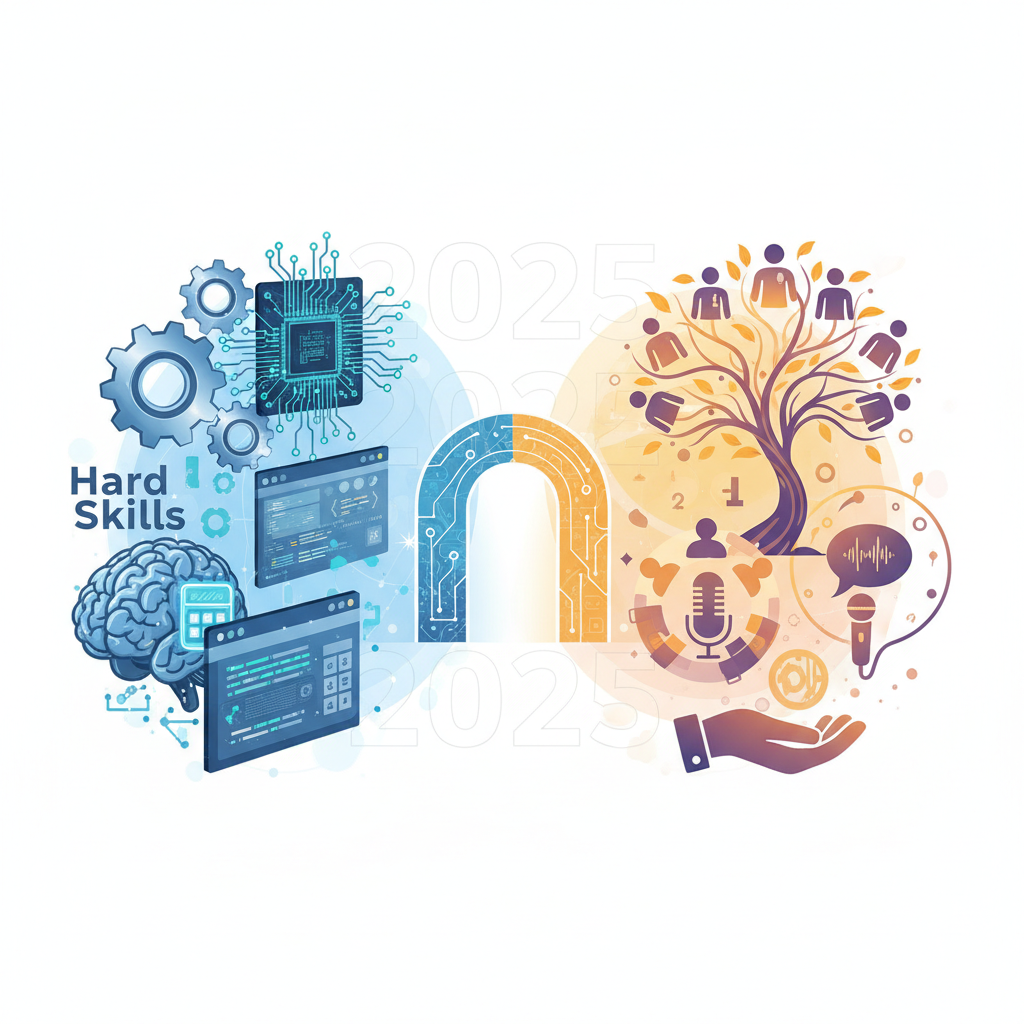The professional landscape in 2026 is evolving faster than ever, driven by technological advancements, global collaboration, and changing workplace dynamics. To stay competitive, professionals must not only hone hard skills like AI literacy, data analysis, and digital marketing but also cultivate soft skills such as emotional intelligence, adaptability, and effective communication.
Mastering the right combination of hard and soft skills is crucial for career growth, leadership opportunities, and long-term professional relevance.
What Are Hard and Soft Skills?
Hard skills are technical, measurable abilities gained through training, education, or hands-on experience. Examples include programming, project management, and data analytics.
Soft skills are interpersonal, emotional, and cognitive abilities that allow professionals to navigate relationships, solve problems, and adapt to change. Examples include teamwork, empathy, leadership, and creativity.
Both types of skills complement each other, and in 2026, organizations are increasingly looking for professionals who excel in both domains.
Top Hard Skills to Master in 2026
- Artificial Intelligence & Machine Learning
AI is no longer optional—understanding AI concepts, applications, and basic ML modeling can give professionals a competitive edge. Even non-technical roles benefit from AI literacy, helping professionals make informed decisions in their domains.
- Data Analysis & Data-Driven Decision Making
Data is the backbone of modern business. Professionals must be skilled in interpreting datasets, using analytics tools, and making strategic decisions based on insights.
- Digital Marketing & Social Media Management
Digital presence is essential. Knowledge of SEO, content marketing, paid campaigns, and analytics can empower professionals to enhance brand visibility and engagement.
- Cybersecurity Awareness
With increasing digital operations, cybersecurity literacy is critical. Professionals should understand threats, safe practices, and compliance standards to protect their organization’s assets.
- Project Management & Agile Methodologies
Mastering Agile, Scrum, and other project management frameworks ensures efficiency, timely delivery, and better collaboration in cross-functional teams.
Top Soft Skills to Master in 2026
- Emotional Intelligence (EQ)
Understanding and managing emotions, practicing empathy, and resolving conflicts effectively can strengthen relationships and leadership capabilities.
- Adaptability & Resilience
In a rapidly changing world, professionals must embrace uncertainty, pivot when necessary, and recover quickly from setbacks.
- Critical Thinking & Problem Solving
The ability to analyze complex problems, evaluate options, and implement innovative solutions is invaluable in any field.
- Effective Communication & Collaboration
Strong communication skills foster clarity, reduce misunderstandings, and enhance teamwork in both remote and in-person work environments.
- Creativity & Innovation
Innovation drives growth. Professionals who can generate new ideas, improve processes, and think outside the box are highly sought after.

Benefits of Mastering Hard and Soft Skills
- Enhanced Employability: Professionals stand out in competitive job markets.
- Higher Productivity: Skills like time management and digital literacy boost efficiency.
- Better Team Collaboration: Soft skills improve relationships, communication, and workplace culture.
- Future-Proof Careers: Staying relevant amidst technological disruption.
Challenges in Developing Skills in 2026
- Rapidly Changing Technology: Professionals must continuously learn to keep up.
- Time Constraints: Balancing skill development with work and personal life can be difficult.
- Resource Limitations: Access to quality training programs may vary.
- Adapting Soft Skills: Unlike hard skills, soft skills are harder to measure and refine.
- Overcoming Resistance to Change: Professionals may face internal or organizational barriers to adopting new skills.
Strategies to Master Hard & Soft Skills
- Continuous Learning: Enroll in online courses, workshops, and certifications.
- Mentorship & Networking: Learn from experienced professionals and peers.
- Practice & Application: Implement skills in real-world projects and tasks.
- Leverage AI & Tools: Use AI platforms for personalized learning paths.
- Feedback & Self-Reflection: Regularly evaluate your progress and adapt strategies.
Examples of Essential Skill Combinations
- Data Analysis + Critical Thinking: Making informed strategic decisions.
- AI Literacy + Creativity: Innovating automated solutions while designing human-centric experiences.
- Project Management + Communication Skills: Leading teams efficiently and fostering collaboration.
Final Words
The professional world in 2026 rewards those who blend technical mastery with emotional intelligence, adaptability, and innovative thinking. By consciously developing both hard and soft skills, professionals can unlock career growth, influence, and lasting impact.
At Ebullient, we help organizations and individuals achieve this transformation. Our customized training programs, leadership workshops, and AI-driven learning solutions are designed to prepare professionals for the challenges of today and tomorrow.
Discover more about our programs and start your journey toward mastery at https://ebullient.in. Let’s shape a future-ready workforce together.
FAQ – Essential Skills for 2026
- How long does it take to master these skills?
Mastery varies by skill and commitment. Hard skills like AI or project management may take months, while soft skills like communication improve continuously with practice. - Can soft skills really impact career growth?
Absolutely. Soft skills influence leadership effectiveness, team collaboration, and workplace influence—factors critical for promotions and long-term success. - Are online courses sufficient for skill development?
Online learning is highly effective, especially when combined with mentorship, real-world practice, and interactive workshops. - How do organizations track skill development?
Through performance metrics, project outcomes, feedback, certifications, and learning management systems (LMS). - Can AI tools help in skill development?
Yes. AI can personalize learning paths, track progress, recommend resources, and provide real-time feedback to accelerate learning outcomes.



